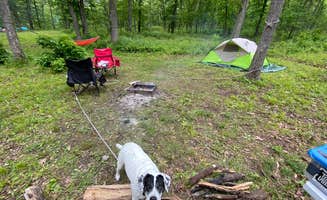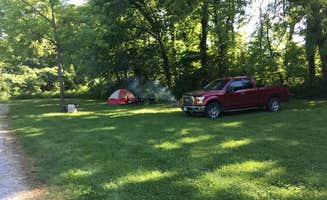Tent campsites near Stover, Missouri provide primitive outdoor experiences amid the Ozark Highland terrain. The region's elevation ranges from 700 to 950 feet with an average annual rainfall of 42 inches, creating lush vegetation and numerous water features. Sites generally sit on uneven ground with mixed soil composition, requiring careful tent placement during the frequent spring thunderstorms.
What to do
Explore underground features: Nearby Rock Bridge Memorial State Park - Educational Scout Camps offers unique geological attractions including cave systems. "I found the Devil's Icebox and was rejoiced by how remarkably cool it was (56 degrees Fahrenheit to be exact!) compared to the thick, humid summer air," reports one visitor who explored the primitive trails.
Wade fishing opportunities: The shallow access points at several conservation areas provide excellent catch-and-release fishing. At Fiery Fork Conservation Area, visitors report "Fly fishing can be done easily from the bank or just by wading in a bit and fish."
Observe wildlife: Dawn and dusk offer optimal wildlife viewing times. "We were able to see some wildlife while staying there as well. Armadillos, deer, and a few different bird types could be found easily," notes a camper at Fiery Fork Conservation Area.
What campers like
River beaches for children: The sandy shorelines provide natural play areas. "We decided it would be a nice place to bring our kids since there is quite a bit of 'beach' at the river access for them to play and see nature," mentions a Fiery Fork visitor.
Hammock-friendly trees: Many tent campsites near Stover feature mature hardwoods ideal for hammock camping. At Scrivner Road Conservation Area, one camper notes the site is "a Swiss Army knife of rugged of the path camping. Rivers, Lakes, Gun range, Horses and hiking can all be enjoyed here."
Affordable getaways: Budget-conscious campers appreciate the free or low-cost options. "Nice area to camp not crowded, plenty of space between camp sites, and peaceful. A nice place if your on a budget and just need a get away," reports one Fiery Fork visitor.
What you should know
Pack extra trash bags: Many conservation areas lack dumpsters. At Fiery Fork Conservation Area, campers report "Much of the area was covered in trash. Bring extra trash bags!" Another camper notes, "There is no dumpster so be prepared to take your trash with you."
No cell service: Emergency planning is essential as most areas have no connectivity. "We had AT&T for our cell service and there was absolutely NO service there which was good to get away, but bad in an emergency," warns one camper about Fiery Fork.
Unpredictable access roads: Spring rains often affect site accessibility. At McCubbins Point, conditions can change rapidly, with visitors noting facilities are often "a bit crowded bathrooms not clean" despite the "nice cooking spots."
Tips for camping with families
Scout for level ground: The region's terrain varies significantly between sites. "The campsites are fine and we were the only ones camping out which was nice," mentions a Fiery Fork visitor who found prime camping space.
Water safety preparation: While water features attract families, supervision is essential. A camper at Farrington City Park reported, "The park itself is well-maintained, and the staff is very helpful and friendly," making it suitable for family outings.
Heavy tick prevention: The region experiences significant tick activity. "Ticks galore! Also be prepared to have no cell signal," warns one camper about conservation areas, recommending thorough tick checks for children daily.
Tips from RVers
Size limitations: Most tent camping areas near Stover have restrictions for larger vehicles. "I recommend smaller RVs due to the 2 miles of gravel and high water areas you go through to get there," cautions a visitor to Bledsoe Ferry.
Generator considerations: Few campgrounds have electrical hookups, and some restrict generator use. A Fiery Fork camper mentioned hearing only "their generator for a bit" from distant neighbors, indicating the importance of quiet operation if generators are allowed.
Road surface challenges: Access roads often require higher clearance vehicles. "The road down was very sketchy for my 2008 Mazda 3," noted one camper, suggesting RVers should scout routes before committing to certain conservation areas.



